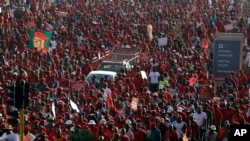Two weeks after South African students launched protests over proposed university fee hikes — and just days after winning a major concession from the president — the demonstrations that rocked South Africa show no signs of stopping.
Recent protests have not seen the intensity of those last week, which prompted clashes with police. Cape Town officers arrested 29 students after a heated protest, while Pretoria police fired tear gas on protesters who attempted to force their way into negotiations between students and elected officials.
Students at Johannesburg’s University of the Witwatersrand — site of the first protests that launched this national phenomenon — said Monday they had no intention of stopping until they reached their greater goal of economic equality.
By Tuesday the flame had quite literally continued to burn as university officials extinguished several campus fires started “deliberately and simultaneously.”
The university's student council says it want leaders to address issues like free education, institutional autonomy and racism.
If anything, it seems that President Jacob Zuma’s Friday concession — that there would be no fee hikes for the 2016 academic year — has only fanned the flames of what could be a major conflagration.
'0%' just the beginning
Even the students say they’re surprised and pleased that their original protest has morphed into something bigger.
“When we started our #WitsFeesMustFall protest, we had no idea the kind of momentum it would gain or the impact it would make not just nationally, but internationally,” said a statement issued by the student council of Wits. “The 0% increment is a victory. It is not the final objective of our movement but it is nonetheless an initial victory.”
President Zuma issued a statement acknowledging his decision was merely a temporary fix and that “discussions would continue.”
His party, the ruling African National Congress, agreed.
“The campaign for accessible education is far from over,” the party’s leadership said in a statement. “Many of our institutions of higher learning remain untransformed with exclusionary practices still entrenched as part of the fabric of the institution. We welcome the institution of a process as alluded to by the president to address, amongst others, the holistic living conditions at institutions of higher education, transformation and the institutional autonomy of universities.”
Root causes
The root of the problem, as it often is in South Africa, is the legacy of apartheid. The racist system of government ended in 1994, but to this day many black South Africans — who comprise the majority of the population — remain economically disadvantaged. South Africa’s last census in 2011 notes, for example, the average white family out-earns the average black family by a factor of six. For many an average black family, which brings in about $4,500 a year [60,600 rand], a $3,000 tuition bill for public university is impossible to pay.
It’s for that reason that the movement has drawn supporters from beyond the core group of protesters. Student Nosipho Nxele, who is 23, goes to a private institution. But, she says, she’s listened her entire life as her government has promised equal opportunity for all.
“I feel like everybody deserves education, no matter what the circumstance is, I feel like everybody deserves it,” she told VOA.
Academics say the intellectual and social legacy of apartheid has left many black students feeling undervalued.
“Twenty-one years after the end of apartheid, very little curricular progress has been made in respect of inserting African philosophies, epistemologies and contextual realities into undergraduate and postgraduate learning and teaching,” said University of Johannesburg Vice-Chancellor Ihron Rensburg in a notice to students. That university says it will launch a task team to incorporate more such thinking into the curriculum by 2017.
The original call to arms was the social-media hashtag #feesmustfall. But in recent days, as the movement continues to grow and evolve, other demands have emerged. There is #nomorefees and #patriarchymustfall and — in an acknowledgment that government policies have not brought about that long-promised equality, and a sign that next year’s local elections could be much more interesting — #ANCMustFall.




